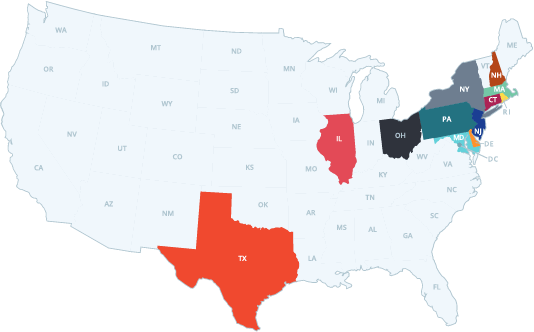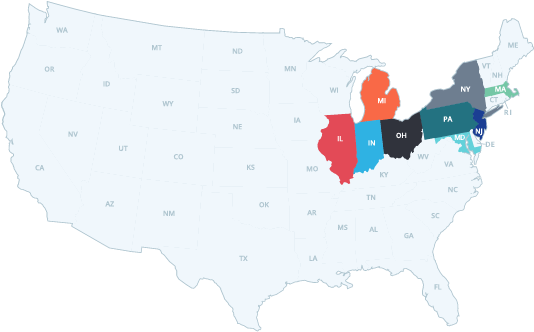The History of Natural Gas Deregulation in Pennsylvania
Natural gas deregulation in Pennsylvania lets you shop for the best natural gas supply plans in your area. Both residential and small business customers of 10 primary local gas utilities have the option to purchase their natural gas supply from a Natural Gas Supplier (NGS) or from their local utility. No matter who you choose to supply your natural gas, your local natural gas utility will continue to deliver the gas to your home or business so You'll still receive that same safe and reliable service.

Natural gas deregulation in Pennsylvania lets you shop for the best natural gas supply plans in your area. Both residential and small business customers of 10 primary local gas utilities have the option to purchase their natural gas supply from a Natural Gas Supplier (NGS) or from their local utility. No matter who you choose to supply your natural gas, your local natural gas utility will continue to deliver the gas to your home or business so You'll still receive that same safe and reliable service.
Now, you're no longer stuck with the old one-size-fits-all regulated monopoly. You can choose providers and services that fit your family's lifestyle needs. Plus, all Pennsylvania residents have the power to choose their natural gas supplier.
The Beginnings
To avoid repeating the natural gas shortages that closed schools and factories throughout the commonwealth (and elsewhere) in the mid 1970s, the Federal Energy Regulatory Commission (FERC) issued Order No. 636 in April 1992 to foster competition in the national natural gas markets.
Before FERC Order 636, suppliers sold natural gas from the well head to pipeline companies. Pipeline companies essentially had control over the natural gas market because they then sold the gas bundled with their transport costs to local gas utilities (known in the business as "local distribution companies" or LDCs). Nowadays, current regulations prohibit pipeline companies from owning the gas in their pipes. They are required by law to transport gas in a non-discriminatory fashion. The means natural gas suppliers must compete for gas purchasers at the other end of the pipelines throughout the country.
In June, 1999, the Pennsylvania General Assembly passed the Natural Gas Choice and Competition Act. The act began the process of unbundling the state's natural gas industry, that is separating sales and marketing from the state's ten natural gas distribution companies (NGDC's), leaving them to run the gas distribution network. Sales and marketing would be taken over by natural gas suppliers (NGS) who would compete for customers through competitive rates. The NGDC's would collect a distribution charge that reflects the cost of pipeline maintenance, billing, and customer service. These old utilities would be prohibited from making a profit on the gas commodity itself but they could through their distribution charges and other rates which are regulated by the Pennsylvania Public Utility Commission (PUC).
Unbundling began on November 1, 1999, and was complete by July 2000. Consumers all over Pennsylvania could choose new natural gas supplier or continue with the existing gas utility.
Part of the Natural Gas Choice and Competition Act specified that the PUC had to evaluate the competitiveness of the state's natural gas supply services in 2004. The PUC discovered that transitioning from a monopoly system to a full-fledged competitive retail market was proving to be work in progress. The PUC's 2005 report stated that Pennsylvania's marketplace was hampered by several barriers to effective competition, including low participation by suppliers and customers, clear pricing information for consumers, differing securitizing requirements, and administrative and regulatory practices.
Rule Making and Rule Changes
In 2006, the PUC appointed a task force known as SEARCH (Stakeholders Exploring Avenues for Removing Competition Hurdles) to devise an action plan that would reduce or eliminate barriers to marketer participation. SEARCH's subsequent 2-year action plan, approved by the PUC in 2008, instituted three significant rule changes:
- The first rule (December 2008) changed the requirements for marketer licensing and revised the consumer protection guidelines. This included the creation of the Office of Competitive Market Oversight (OCMO) to oversee the gas market's development and functioning as well as resolve disputes between natural distribution companies (NGDC's) and natural gas suppliers (NGS's).
- The second rule (March 2009) reformulated the "price to compare" in order to give consumers more accurate and up-to-date information about rates offered by NGS and their local utility.
- The third rule (April 2009) established common business practices for local utilities to attract NGSs to their individual competitive markets. These rules established clearer rules governing financial transactions, communications, and data exchange.
Pennsylvania's Natural Gas Choice is Working!
It's no secret that natural gas deregulation went through a difficult start in Pennsylvania. According to Pennsylvania's Office of Consumer Advocate, 10 percent of the State's residential customers purchased natural gas from alternative suppliers when the program first began. But by 2004, this had dropped to 7 percent and hovered at this level through 2007.
But now the PUC's rule changes has since helped reverse that trend. In November, 2014, participation is on the rise with 13.2 percent of residential customers signed up — that's 349,384 out of 2.6 million.
There's also more competition than ever before. In December 2006, 28 marketers were licensed to serve residential customers in the State, but only 4 companies were enrolling new customers. Now, there are 130 licensed natural gas suppliers In Pennsylvania. More competition is driving prices lower and offering consumers more options. Many gas suppliers now offer additional incentives and reward programs to their customers —something the old utilities rarely did.
Plus natural gas prices have come down, too. PUC data shows that gas cost rates have declined largely due to growing shale supplies. According to the EIA, residential prices have dropped over $5/ccf since the high prices of 2008.
Whether they have switched to a competing gas supplier or are keeping their old local utility, Pennsylvania gas customers are seeing benefits from natural gas choice — lower prices and better reliability. Now you have a choice beyond Pennsylvania's old utility monopoly. You can choose a provider offering services that fit your family's modern lifestyle.
 CANADA
CANADA USA
USA









